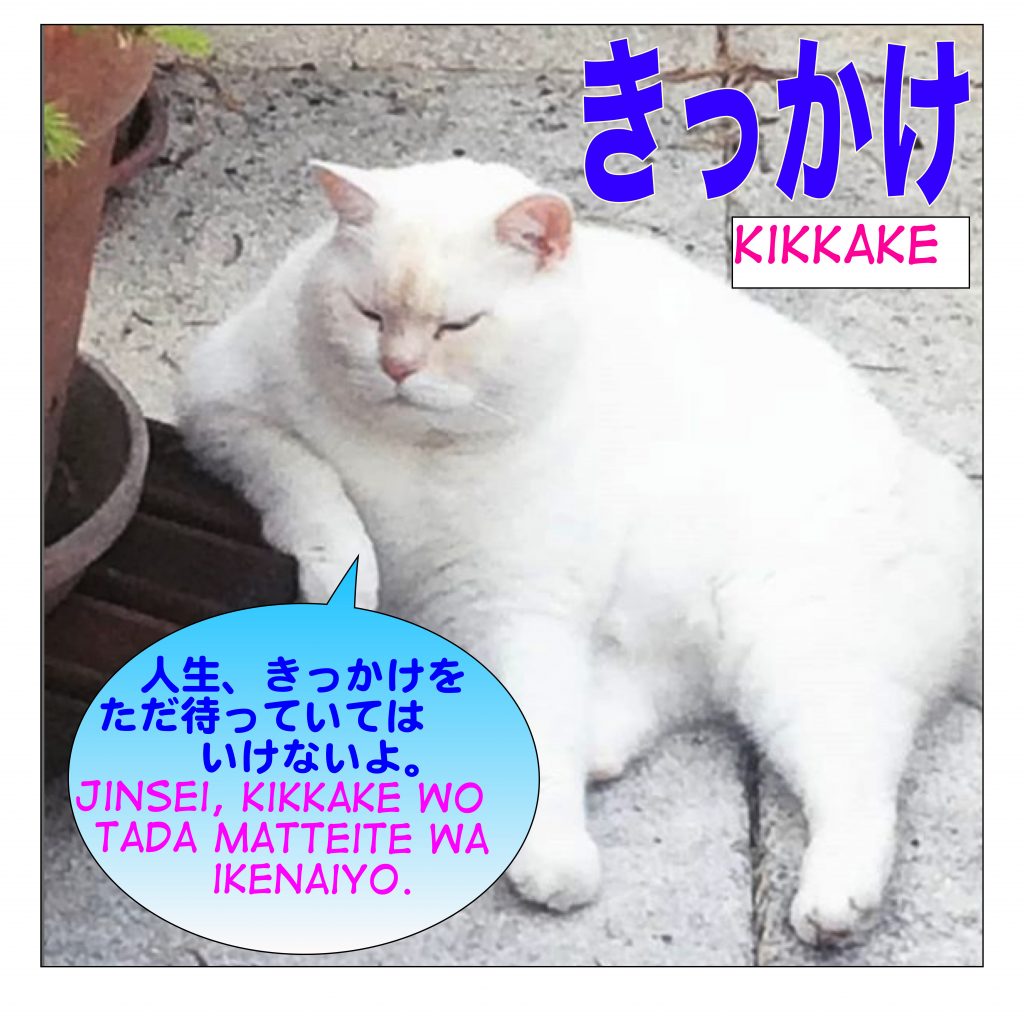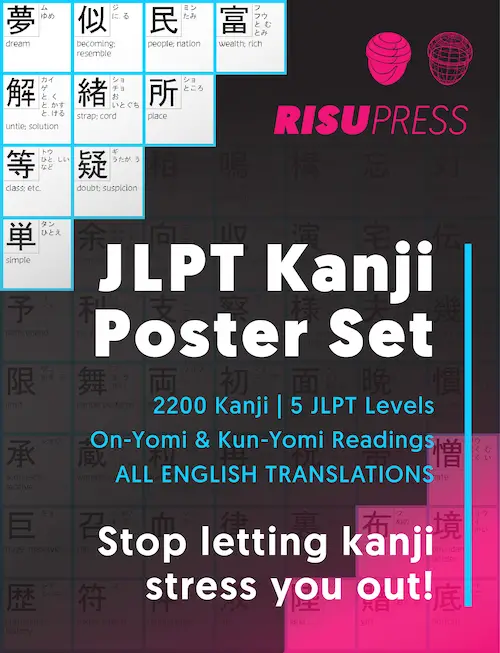
無断転載禁止(All rights reserved)
Today, by request, I am going to teach you the word, きっかけ ( = kikkake)The translation of きっかけ ( = kikkake) changes depending on the context but it means “original motive, incentive, chance, opportunity, reason, or something that triggers an incident” This word is used to describe something that leads you to the current state, and it the reason why you decided to do something
It can be used in both positive and negative situations.
Ex. A:「日本に来たきっかけはなんですか?」
= Nihon ni kita kikkake wa nan desu ka?
= What brought you to Japan?
B:「ジブリ映画を見てからずっと日本に行ってみたいと思っていました。」
= Jiburi eiga wo mite kara zutto nihon ni itte mitai to omotte imashita.
= Ever since I watched some GHIBLI movies, I’ve wanted to come to Japan.
Ex. 「日本語に興味を持ったきっかけはなに?」
= Nihongo ni kyoumi wo motta kikkake wa nani?
= What got you interested in the Japanese language?
Ex. きっかけがなんであってもボランティア活動をするのはいいことだと思う。
= Kikkakake ga nande atte mo borantia katsudou wo suru no wa ii koto da to omou.
= Whatever the initial reason is, I think it’s great to do volunteer work.
Ex. これといったきっかけがあったわけではないが、なんとなく彼と別れてしまった。
= Koreto itta kikkake ga atta wake dewa nai ga, nanto naku kare to wakarete shimatta.
= There wasn’t really a specific reason, but for some reason I broke up with him.
Ex. 家族の思い出を作りたいという姉の言葉がきっかけとなり初めて海外旅行に行った。
= Kazoku no omoide wo tsukuritai toiu ane no kotoba ga kikkake to nari hajimete kaigairyokou ni itta.
= My big sister said she wanted to make memories with the family so we went overseas for the first time.
Ex. 今回のスクールキャンプは子供達が自立するいいきっかけを与えたと思う。
= Konkai no sukuuru kyanpu wa kodomotachi ga jiritsu suru ii kikkake wo ataeta to omou.
= I think this school camping trip gave children a good opportunity to be independent.
Ex. 彼女と喧嘩をしてしまったが、仲直りするきっかけが欲しい。
= Kanojo to kenka wo shite shimatta ga, nakanaori suru kikkake ga hoshii.
= I got fight with my girlfriend, but I need some opportunity to make up with her.
Ex. なにかきっかけがないと新しいことが始められない。
= Nanika kikkake ga nai to atarashii koto ga hajimerarenai.
= I can’t start new things without having an initial reason.
***
The common patterns to use きっかけ ( = kikkake ) are the following patterns.
⭐️~ がきっかけで ( = ga kikkake de) ~
⭐️ ~ をきっかけに ( = wo kikkake ni ) ~
You started doing something or you decide to do something after something happened.
As a result of ~ you ended up doing something/something happened.
The きっかけ( = kikkake) is the incident / happening / event/action / thing that leads to a consequence or the current state/situation.
Note: Basically these two uses ( 〜がきっかけで ( = ga kikkake de) ~ / 〜をきっかけに ( = wo kikkake ni ) ~) are translated the same and in most cases, they are interchangeable.
However there is a slight difference in nuance.
〜 がきっかけで ( =~ ga kikkake de) is focusing the cause more than 〜をきっかけに ( = ~ wo kikkake ni)
(〜をきっかけ)に ( =~ wo kikkake ni ) is focusing on the time when something happened and since then things have changed.
(Original form) ~ がきっかけになる ( = ga kikkake ni naru)
→ ~がきっかけになり ( = ga kikkake ni nari)
→ ~がきっかけで ( = ga kikkake de)
(Original form) ~ をきっかけにする ( = wo kikkake ni suru)
→ をきっかけにして ( = wo kikkake ni shite)
→ をきっかけに ( = wo kikkakeni )
⭐️ How to form:
1) verb
* verb + の ( = no ) / こと ( = koto)+ が ( = wo) + きっかけで ( = kikkake de)
Ex. After they had a fight, they stopped talking to each other.
→けんかしたの*をきっかけに二人は口をきかなくなった。
= Kenka shita no wo kikkake ni futari wa kuchi wo kikanaku natta.
= Kenka shita no ga kikkake de futari wa kuchi wo kikanakunatta.
に ( = ni) focusing on the time when they got into the fight So if I try to translate the sentences literally:
Ex. 「あの二人はどうして口をきかなくなったの?」
= Ano futari wa doushite kuchi wo kikanakunatta no?
= How come they stopped talking to each other?
「けんかしたのがきっかけでお互いに避けるようになったみたいだよ。」
= Kenka shita no ga kikkake de otagai ni sakeru you ni natta mitai dayo.
= It seems like they have started to avoid each other because they got into a fight.
「いつから口をきかなくなったの?」
= Itsu kara kuchi wo kikanaku natta no?
= Since when have they stopped talking to each other?
「けんかしたのをきっかけにお互いに避けるようになったみたいだよ。」
= Kenka shita no wo kikkake ni otagai ni sakeru you ni natta mitai dayo.
= It seems like they started avoiding each other after they got into fight.
**
Let’s see more example sentences with ~ がきっかけで ( = ga kikkake de) ~& ~ をきっかけに ( = wo kikkakeni ) ~
Ex. この映画を観たのがきっかけで宇宙に興味を持ち始めた。
= Kono eiga wo mita no ga kikkake de uchuu ni kyoumi wo mochihajimeta.
= Since watching this movie, I’ve become interested in the universe.
Ex. 入院した時に看護師の人に優しくしてもらったのがきっかけで看護師になろうと決めました。
= Nyuuin shita toki ni kangoshi no hito ni yasashiku shite moratta no ga kikkake de kangoshi ni narou to kimemashita.
= After being hospitalized and being treated so nicely by the nurses, I decided to become a nurse.
Ex. 失恋がきっかけで自分探しの旅に出た。💔
= Shitsuren ga kikkake de jibun sagashi no tabi ni deta.
= After I got my heart broken I went on a trip to find myself.
Ex.「何がきっかけで日本語を勉強しようと思ったのですか?」
= Nani ga kikkade de nihongo wo benkyou shiyou to omotta no desu ka?
= What inspired you to study Japanese?
「日本のアニメが好きだったから。」
= Nihon no anime ga sukidatta kara.
= Because I liked Japanese anime.
Ex. 二人はどういうきっかけで知り合ったの?
= Futari wa douiu kikkake de shiriatta no?
= How did you two meet?
***
Ex. 学生の時に北欧に行ったのをきっかけに毎年北欧にいくようになった。
= Gakusei no toki ni hokuou ni itta no wo kikkake ni maitoshi hokuou ni iku you ni natta.
= Since going to North Europe when I was a student, I started going there every year.
Ex. 父に怒られたのをきっかけに毎日宿題をし始めた。
= Chichi ni okorareta no wo kikkake ni mainichi shukudai wo shihajimeta.
= Since I got scolded by my father, I’ve started doing my homework every day.
Ex. 25歳になったのをきっかけに転職した。
= Nijuugosai ni natta no wo kikkake ni tenshoku shita.
= I changed my job when I turned 25.
Note: A similar expression to ~をきっかけに ( = wo kikkakeni) is
→ something を ( = wo) 機に ( = kini)
機に ( = kini) is more formal than きっかけに ( = kikkakeni)
→25歳になったのを機に
= nijuugosai ni natta no wo ki ni
→25歳を機に
= nijuugosai wo kini
Ex. これを機にたばこをやめます。
= Kore wo ki ni tabako wo yamemasu
= I will take this opportunity to quit smoking.
Ex. 大学に入ったのをきっかけに親元を離れた。
= Daigaku ni haitta no wo kikkake ni oyamoto wo hanareta.
= I moved out of my parents’ house when I got into university.
→大学に入ったのを機に 親元を離れた。
= Daigaku ni haitta no wo ki ni oyamoto wo hanareta.
**
 マギー先生より = Maggie Sensei yori = From Maggie Sensei
マギー先生より = Maggie Sensei yori = From Maggie Sensei
このサイトがきっかけで日本語の勉強が好きになってくれたらいいな。
= Kono saito ga kikkakede nihongo ga suki ni natte kuretara iina.
= I would be happy if you started to like studying Japanese because of this site.
***
I REALLY appreciate your support! サポートありがとう! !
My supporters can access audio files for many lessons on my Patreon page and lots of mini-lessons and quizzes.
Audio Files for this lesson
![]() Part 1 Click here.
Part 1 Click here.
![]() Part 2 Click here.
Part 2 Click here.
:u:


17 Comments
Hello. Thank you very much telling about the differences が/を with きっかけ。But i have one question. In my textbook there is a example: いつたばこをおやめになったのですか。and answer: 彼女にやめると言われたのがきっかけなんです。So they are asking “when/いつ” ,but the answer is “がきっかけ”、not ” をきっかけ”.why?thank you for your answer
Hi Maria
OK, actually your sentence doesn’t have で and に and it ends with 〜(なん)です
but you can rephrase it.
The reason why I quit smoking was because she told me to quit.
→たばこをやめたのは、彼女がやめろと言った(or 彼女にやめろと言われた)からです。
いつ?
→彼女がやめろと言った(or 彼女にやめろと言われた)のをきっかけにたばこをやめた。
The time when I quit smoking was when she told me to quit.
→たばこをやめたのは、彼女がやめろと言った(or 彼女にやめろと言われた)時です。
なぜ? Why?
→彼女がやめろと言った(or 彼女にやめろと言われた) のがきっかけでたばこをやめた。
Thank you. That sounds much better=)
Good! :)
Hey
Thank you for explaining this. However, I’m confused about this spot:
→けんかをきっかけに二人は口をきかなくなった。
= Kenka wo kikkake ni futari wa kuchi wo kikanakunatta. The nuance difference between に ( = ni ) and が ( = ga) here is
で ( = de) focusing on the cause, fight
に ( = ni) focusing on the time when they got into the fight So if I try to translate the sentences literally:
You say difference between に and が, but explain で and に instead in an article about が vs を きっかけ. Is it a typo? I really want to understand the difference.
Hey 😆
Sorry. I changed the part that you got confused. It was confusing since there are two sets of particles.
Hi Maggie,
I’d like to ask, what’s the nuance between 日本に来た理由は・日本に来たきっかけは?
Thank you.
Hello, JP Arcilla
理由 is more general.
As I wrote in the lesson きっかけ means “original motive, something that triggers an incident”
Since the translation can be the same, reason, but the answer is a key to figure out the difference.
ずっと日本に行きたいと思っていた。I have been wanting to go to Japan for a long time.
can’t be きっかけ
子供の頃、〜というアニメを見た can be either 理由 or きっかけ
It makes sense, since it feels like きっかけ is more of a “trigger”. Lastly, 「彼女と喧嘩をしてしまったが、仲直りするきっかけが欲しい 」is translated as i want an opportunity to make up with my girlfriend.
If I wanted to say “I will USE this opportunity to make up with my girlfriend”, would it be okay to say
・仲直りするきっかけを掴む
・これから仲直りきっかけがあれば絶対掴むよ
Sorry if I’m asking detailed questions, I just want to make sure I understand the concept and flexibility of the word itself.
いつも詳しく説明してくれてありがとうございます。
Sorry for the double comment, couldn’t find an edit button since I made a mistake.
EDIT:
If I wanted to say “I will USE this opportunity to make up with my girlfriend”, would it be okay to say
・今回の仲直りするきっかけを掴む
・これから、仲直りするきっかけがあれば絶対掴むよ
Hello,
You don’t say きっかけを掴む like チャンスを掴む
If you want to use the word きっかけ in that sentence,
これをきっかけに彼女と仲直りしたい。
or use the word 機会・チャンス
今後、仲直りする機会 ( or チャンス)があれば絶対に逃さないよ。
Thanks for this wonderful lesson. This word is kinda new to me so it’s a little bit hard to absorb as it has different meanings depending to the context but I’ve found it very useful. I think I’m going to read this lesson everyday so I can use it properly!
Hello macaron,
Good! Now what you have to do is practice using the word.
このレッスンをきっかけに「きっかけ」の使い方を覚えてくださいね。😉
いやあ、日本語を勉強しているのがきっかけでこのサイトをよく調べています!
また来てね〜😊
(Note for you: 〜がきっかけでこのサイトでよく調べるようになりました。 is more natural. )
わかりました。修正してくれてありがとう!
いつでも練習してくださいね。😊